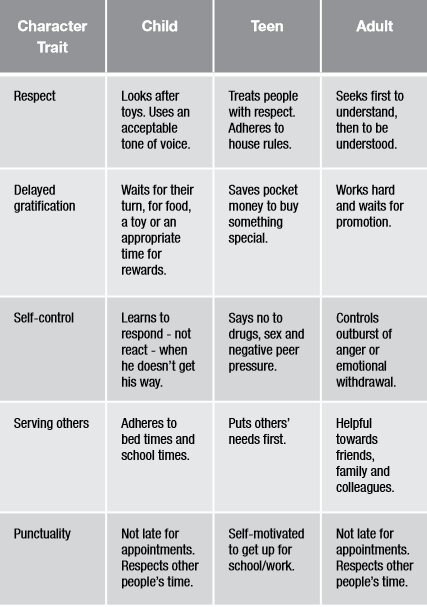
What is character and how important is it?
Character is who and what you are, and how you respond or react when no significant person is watching. It’s what you do and who you are when you know you won’t be getting recognition or acknowledgement. Facing obstacles in life develops character. It affects your behaviour, how you respond in different situations and your attitude towards people around you. Character helps us to deal with real life issues. It is the vehicle that helps to steer us through situations.
Character is like a tree and reputation like a shadow. The shadow is what we think of it; the tree is the real thing. – Abraham Lincoln
For character to change, this cycle needs to happen:
Ah-ha: This is an awareness that something needs to change. Think: Time needs to be spent processing the awareness. Decide: A decision must be taken to make a change. Action: An action plan needs to be put into place. Repeat: The new action must be done over and over. Habit: This repetition of experience develops character.
This is why when you have an ‘ah-ha’ about something and you want to make changes immediately, you sometimes wonder why your spouse does not instantly agree. The process for your spouse also needs to start at the beginning, not halfway through the process, as they also need time for it to sink in.
Consider positive character traits like these:
- Integrity
- Honesty
- Punctuality
- Morality
- A sense of caring for others
- Good manners
- Working well with finances
- Consideration for others
- Self-controlDelayed gratification
- Respecting elders
- Communication
- Generosity
- Helpfulness
- Independence
- Patience
- Working Hard
- Respecting others and their boundaries.
These are all character traits – regardless of temperament or birth order – that need to be instilled in children from a young age. They do not simply appear one day. If they haven’t been developed at a young age through exposure and example, how can you expect them to be there as an adult?
How can we as parents help develop character in our children?
Character is developed through relationships. We learn to love by receiving love, giving love and serving others. We teach children to be responsible adults by teaching them to be accountable through owning their feelings and accepting responsibility for what they have done. Most importantly, children need to see positive character traits modelled in their parents. It is the parent’s duty to teach and re-teach these characteristics. Good morals are caught, not taught! Parents model honesty and provide children with a safe environment in which to be vulnerable. You could be raising the next president – what qualities would he need to fulfil that role? What can you do to help prepare your child for life’s pressures and challenges?
A child should have relational experiences with a parent so that he can be prepared for life. – Cloud and Townsend
A parent’s job is to prepare a child for reality, that is, the REAL world. Having a sibling is one great way to develop character. You have to share, wait, give, listen, serve, help, take turns, etc. This is great training ground for the real world. So when you bring home a baby brother or sister, don’t feel sorry for the elder sibling; instead re- joice! Children have to learn that they have to adapt, not expect the situation to change. For instance, how do you develop patience without ever having to wait for something? How do you learn self-control if you have never been told, ‘No, you can’t have that cookie’ when you really wanted one? How do you learn what success is if you have never failed? How do you know what it feels like to work hard for something, save up and finally buy it, if you have always been given what you asked for? We are designed and created in such a way that we flourish when we have hope, and feel depressed if there is no hope. How do you ex- perience hope when you have never had to wish and wait for some- thing special? Children need to learn there is a difference between not being able to do a task and feeling uncomfortable about attempting the task. They need to experience the sense of pushing through the feelings of discomfort to enjoying the feeling of achievement.
Hope deferred makes the heart sick, but a longing fulfilled is a tree of life. – Proverbs 13:12.
Making our children wait allows them to experience that feeling of anticipation, to hope for something unseen, strive for something, persevere, endure, attain a goal. If they constantly get what they want, when they want, how they want, what are we teaching them? Haven’t we all learnt our most valuable lessons through ‘painful’ experiences? Parents often say to me ‘But I don’t like seeing my child cry or being unhappy, it makes me sad’ – well, is this about you, or is it about what’s best for your child? Isn’t it truly unselfish to say, ‘I will put my feelings aside to do what’s best for my child, even if it is painful for me’? In some countries they have removed sport from the schools so that no one feels disappointed, or experiences what it feels like to lose or come second. Everyone must feel and be treated the same. They even use reward systems like stars in the same way – everyone gets a star, be- cause no one must feel left out. When one child has a party, the sibling must also get a present. Why? Have you thought about the life’s lesson children are learning when parents take this approach? Does the real world operate like this? When parents wrap their children in bubble wrap to prevent them from experiencing any negative feelings or disappointments, the children never learn how to respond to these feelings when faced with them in real life. Losses and challenges form a part of reality. The different stages – denial, anger, bargaining, depression and acceptance – are extremely important emotions to experience and learn to cope with, in order to be prepared for the real world. This is true for any- thing from losing a goldfish to losing a grandparent, from not being picked for a team to not being able to buy the pair of shoes you really want. A new generation of young people has arisen with no work eth- ic, no perseverance or loyalty towards their jobs, their families or their friends. They have never had to experience emotions like delayed gratification, patience and endurance because their parents have protected or saved them from it.
Steven Covey says to ‘begin with the end in mind’. If you consider the character traits you would like to see in your child as an adult, how would you recognise them at the different stages of development?

Are you willing to lead by setting an example in each of these areas through living them out in your own home?
Disappointment is the gap between expectation and reality. – John Maxwell





